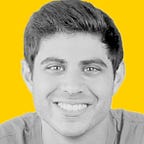M2M Day 243: Attempting to solve a Saturday New York Times crossword puzzle
This post is part of Month to Master, a 12-month accelerated learning project. For July, my goal is to solve a Saturday New York Times crossword puzzle in one sitting without any aid.
Today, I start a new month and a new challenge: With only one month of practice, can I complete a Saturday New York Times crossword puzzle in one sitting without any aid.
Why the Saturday NYT puzzle?
According to Anders Ericsson, the researcher of expertise whose work is the basis for Malcolm Gladwell’s 10,000 hour rule, crossword puzzles are one of the few things that can’t be mastered in any systematic way.
In Ericsson’s book Peak, he explains that “some activities, such as playing music in pop music groups, solving crossword puzzles, and folk dancing, have no standard training approaches. Whatever methods there are seem slapdash and produce unpredictable results”.
I’m not sure how folk dancing and crossword puzzles ended up in the same category, but nevertheless, the point is clear: Ericsson, the preeminent authority on expertise and human performance, doesn’t believe crossword puzzles can be mastered in a predictable, accelerated fashion.
So, naturally, I see this as a challenge.
To take this challenge further, I’ve decided to maximize the level of difficulty: The New York Times (NYT) has the reputation for publishing the most challenging crossword puzzles, and the Saturday puzzle is designed to be the most challenging puzzle of the week.
In other words, the Saturday NYT crossword puzzle is the most difficult of all the crosswords. So, if I can crack the Saturday puzzle, I should be able to complete any other crossword puzzle, from the NYT or otherwise.
One point of clarification: The NYT puzzle gets more difficult throughout the week. The easiest puzzle is on Monday and the most challenging puzzle is on Saturday. The Sunday puzzle is a significantly larger puzzle (with a 21x21 grid, versus the Monday-Saturday 15x15 grid), but has a difficulty level of a Wednesday or Thursday.
Defining success
To complete this month’s challenge, I must fulfill three criteria:
- I must complete one entire Saturday NYT crossword puzzle. In other words, the entire 15x15 grid must be filled in — with the correct letter in every square. If the puzzle happens to be from this month, that would be great, but it’s not a requirement. As long as I’ve never seen the puzzle before, it’s fair game.
- I must complete the puzzle in one sitting. In other words, once I start the puzzle, I must complete it during that session. This is basically a slightly less defined time constraint.
- I can’t use any aids. I can’t lookup any answers or ask for help in any capacity. All my answers must come from my brain.
My starting point
During my freshman year of college, I started doing the NYT crossword every Monday (since the newspaper was freely distributed in the student center and dining halls).
Most Mondays, I couldn’t complete the puzzle (even though Mondays are supposed to be the “easiest” puzzles of the week), but I came fairly close. I occasionally tried the Tuesday puzzle, but could never get very far.
After freshman year, I mostly stopped solving crosswords, completing only a few easy puzzle every year.
A few months ago, I subscribed to the NYT crossword app, and started solving the Monday puzzles again. I’ve also tried the Tuesday and Wednesday puzzles, but I still can’t solve them without some help.
To set the baseline for this month’s challenge, I tried to solve the Saturday NYT puzzle from today (July 1, 2017).
According to Rex Parker, the most popular NYT crossword blogger, today’s puzzle has a relative difficulty level of easy. In other words, I should expect to do worse on an average Saturday puzzle.
Here’s what I was able to fill in…
And, if you want, here’s an 18-minute screencast where I commentate as I try to solve the puzzle.
Clearly, I have a long way to go.
As I say in the video, “I did better than I expected, and worst than I hoped”.
Anyway, I’m excited to see if I can prove Anders Ericsson wrong, but I’m nervous that he might be right. We will soon find out…
Read the next post. Read the previous post.
